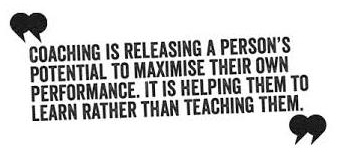[box type=”info” style=”rounded”]
This section offers amplification on how the LQF interprets ‘Coaching’ and outlines the issues around Indicator thread 5.3, which states:
[/box]Coaching Learning.
This progression of indicators is about the extent to which coaching partnerships are used to support professional development.
…using a coaching approach to teaching
 “Expert tutors often do not help very much. They hang back, letting the student manage as much as possible. And when things go awry, rather than help directly they raise questions: ‘Could you explain this step again? How did you… ?’” (Mark Lepper)
“Expert tutors often do not help very much. They hang back, letting the student manage as much as possible. And when things go awry, rather than help directly they raise questions: ‘Could you explain this step again? How did you… ?’” (Mark Lepper)
When we are curious we are genuinely interested in learning. Curiosity lies at the heart of coaching, hence coaches are effective listeners and ask questions to open dialogue without sounding like an interrogation. Coaching aims to enable people to see what they are doing more clearly and discover their own ways to improve. A coaching approach:
- helps people to explore their challenges, problems and goals
- provides an objective view of peoples actions to enable them to see things as as they really are
- enhances motivation and raises self-esteem
- builds curiosity and encourages learning
Above all, coaches resist offering solutions. Offering solutions does little to secure learning as the student hasn’t been allowed to confront and engage with the problem and find their way forward. Learning powered teachers adopt a coaching role. But…
- the content /skill needs to be discoverable so teachers need to know the subject well
- the learner needs to be able to discover it for themselves hence teachers need to know learners well.
The key is knowing when to coach and when to teach/tell. Hence coaching is one of the highest teaching skills, requiring both a deep understanding of both subject content and the students as learners.
The skills of effective coaches.

Effective coaches create learning by:
- Asking permission to give feedback—‘I’d like your permission to. . . ‘
- Offering information in a form that students can make use of: structuring it from their viewpoint, breaking it up into digestible chunks.
- Being specific and objective. Concentrating on the issues, not the person—what happened, when, how—in order to avoid appearing judgemental.
- Owning the feedback—‘I saw’, ‘I heard’, ‘I found’, and allowing students to choose how to use the information.
- Encouraging dialogue about the evidence—‘What might this mean?’ ‘Why do you think that happened?’ ‘How does this relate to that?’
- Building up confidence, giving encouragement and combating self-criticism: confident people learn better.
- Being prepared to address problems and difficulties, and allowing students to be open about their feelings.
- Allowing time for students to generate their own suggestions, alternatives, solutions.
- Offering suggestions only when requested.
- Using their knowledge of a student’s skills, experience in other aspects of their life to draw out possible solutions—‘I know you have … before. How might that experience contribute to this issue?’
Coaching is at its most effective when the person being coached has the skills and inclination to find out for themselves. Mentoring, which is frequently confused with coaching, is employed to raise skill and/or inclination so that coaching can resume. Highly effective coaches are alert to when they can afford to coach and when they have to mentor. It is about striking the balance between teachers teaching and learners learning.
The coaching skills of effective leaders.

If leaders (at all levels) want their teachers to become learning coaches, and in time learners to become peer learning coaches, they too will have to act as learning coaches, modelling the behaviours they wish to promote. There would be a certain irony in leaders adopting a top-down, didactic approach to developing classroom coaching behaviours!
It follows that all leaders and teachers need to be well-versed in coaching as a means of developing learning in others.
But be alert – some people say they understand about coaching because they have personal experience of ‘being coached’. While for some, this may well be true, for others ‘being coached’ actually means ‘being taught by someone called a coach’ (like a tennis coach). Do not assume that everyone has the same view of coaching as outlined in the previous 2 sections.